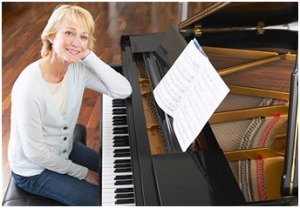 Learning to play an instrument at any age comes with set of challenges. Whether it’s the piano, banjo, or autoharp, mastering a musical instrument is like learning a new language. To adults who have never played before, learning to play can feel like learning to speak Chinese and program computers – at the same time. But, it’s not impossible for adults, just a little more difficult.
Learning to play an instrument at any age comes with set of challenges. Whether it’s the piano, banjo, or autoharp, mastering a musical instrument is like learning a new language. To adults who have never played before, learning to play can feel like learning to speak Chinese and program computers – at the same time. But, it’s not impossible for adults, just a little more difficult.
When children begin learning to play instruments, their brains are still growing new brain cells and some of those new cells become devoted to playing. In the adult brain, learning an instrument requires that new connections are created, as cell growth in the brain is done. This leads to challenges for adults who are picking up an instrument for the first time, but it isn’t insurmountable.
In order for adults to be successful, they must accept that (1) they will not become virtuosos, (2) it will be difficult, and (3) it is a little scary at first. Getting over those psychological barriers goes a long way to learning to play. Finding a great teacher is also key. Rather than looking for the best musician in town, consider a teacher who understands how adults learn. Teachers who understand adults will offer constructive criticism that will aid in getting the most out of practice sessions and future lessons.
When deciding whether or not to pick up that guitar that’s been sitting in attic, untouched until “someday,” think about the benefits that can result from learning. The practice and concentration that go into learning to play are good for the brain. Playing requires the use of so many parts of the brain, often at the same time, the brain will experience a tremendous workout. Playing an instrument can also help ward off depression, boredom, and loneliness in old age. And, there is no better feeling than that of accomplishment, even if it comes in the form of “Mary Had a Little Lamb.”